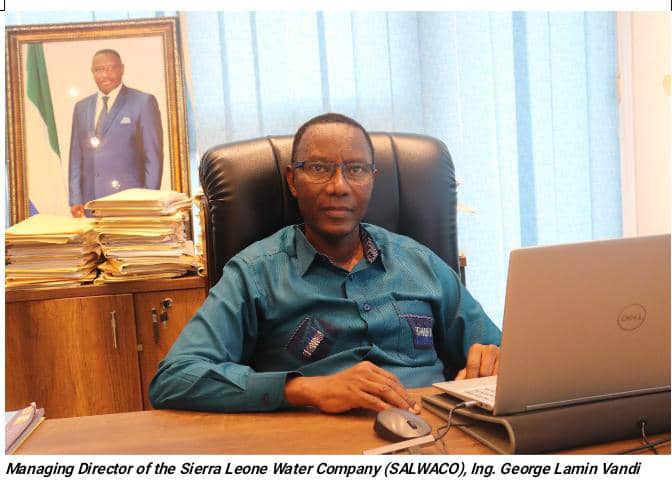On Monday 6 May 2024, Sierra Leone Vice President Dr Mohamed Juldeh Jalloh launched the Sierra Leone Human Capital Development (HCD) Coordination Framework and Advocacy Training Workshop at the Bintumani Hotel Conference Hall, Aberdeen in Freetown. Vice President Jalloh stated that the Government of Sierra Leone in collaboration with development partners have made tremendous strides in human capital development, adding that there has been tangible progress in Government investment across various sectors over the past five years including knowledge, skills and wellbeing of the people. He recalled human capital development been the first pillar in the 2018-2023 national development plan, and it constitute the second cluster in the 2024-2030 national development plan.
Vice President Jalloh narrated some of the tangible progress that serves as potential entry point to position the importance of coordination and coherence. He retrospect on the rolling out of the free quality education by President Julius Maada Bio in 2018, by allocating 22% of the national budget which has yielded positive dividend. He explained the tremendous increase in the enrolment in primary and secondary schools, investment in the expansion of technical-vocational training, increase of more girls in basic secondary schools and young ladies over-populating the faculty of pure science now than before in Sierra Leone. He spoke about the extension of early learning opportunity to rural communities that never saw early learning foundation institutions.
On the health sector, the Vice President narrated that Government has invested enormous resources especially on maternal and infant health through the tremendous increment of the health budget. He informed about the recruitment of over ten thousand health workers, investment in building new schools for the training of midwives, provision of new equipment. He also said that the baby-care units have been expanded from regional to district across Sierra Leone, maternal mortality reduced by 38% in the last five years and 60% in the last two years. The maternal mortality reduction made Sierra Leone a shining star in Sub-Sahara Africa, he averred.
The Honourable Vice President maintained that Government focus is on the first twenty-two months of human being, from pregnancy, to delivery of the baby. He recalled his visit in 2018 to the maternal ward at the Government Hospital in Pujehun Town which was empty but discovered later those pregnant women were out of the ward to search for food in the town, noting that it was then he realized that Government should double it effort to improve on nutrition. He reiterated it was because of the Pujehun experience that he engaged the relevant stakeholders for a special budget line for nutrition and there is a special budget for nutrition today in the country, adding Sierra Leone is one of the countries with a dedicated budget for nutrition.
“In the area of gender, we’ve made tangible progress as well” he says. He narrated about the provision of training for the youths, expanded opportunities for young businesses to grow, transform the labour ministry. He noted that Government has been making modest investment in agriculture in the area of mechanization even before the launched of the “Feed Salone” proggramme. He informed about the tangible steps taken after the launched of the “Feed Salone” initiative to expand investment in agriculture and food production. The rationale behind “Feed Salone” is to progressively reduce the country’s dependence on food importation and boost domestic food importation and diversify the economy, Vice President Jalloh opined, noting that agriculture is seen as an entry point to boost economic growth and create employment.
The Vice President maintained that there are challenges with the human capital development despite the gains made. He flashbacks on the United Nations/world Bank human capital report that acknowledged the gains made in education, health, and nutrition. Though he elucidated that the report highlighted some opportunities such as deep-seated governance issues such as coordination across sectors, improve data gathering and collection, and resource mobilization. He stated that the only way the country can multiply the gains made is to address the coordination and coherence challenges. He therefore described the Sierra Leone National Human Capital Development Coordination Framework as vital that will help strengthen coordination and improve coherence, and leverage data and technology.
Madam Finda Koroma, Chief Executive Officer, Human Capital Development Plus (HCD+) in her opening remarks defined human capital development as a life-long accumulation of knowledge, skills and health for the most essential resources to realize the full potential of people as productive members of society. She explained that her organization’s advocacy for increase investment in HCD is focused on five key pillars: Health security; nutrition and food security; education, skills development and labour participation; entrepreneurship and financial inclusion; and gender transformation.
She said her organization’s goals are pursued through effective collaboration with member states of the regional economic community for effective reporting on HCD performance across the continent. She furthered that her organization advocates with Heads of States, decision makers and other relevant stakeholders to make HCD a priority in Africa, stressing that HCD+ support resource mobilization for advancement in game changing in HCD programmes across African Union member states.
Credit:Aaron Bundu Lahai-Head of Media & Public Relations













